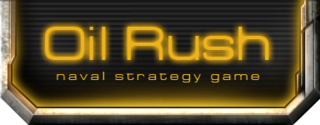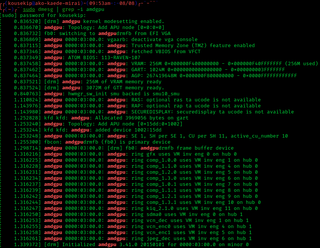Reiser4 is a computer file system, successor to the ReiserFS file system, developed from scratch by Namesys and sponsored by DARPA as well as Linspire. Reiser4 was named after its former lead developer Hans Reiser. As of 2021, the Reiser4 patch set is still being maintained, but according to Phoronix, it is unlikely to be merged into mainline Linux without corporate backing.

Nexuiz is a free first-person shooter video game developed and published by Alientrap. The game was released under the GNU General Public License (GPL) and uses the DarkPlaces engine, a modified Quake engine. A remake, also called Nexuiz, was released for Steam and Xbox 360 using CryEngine 3. The original game was released on May 31, 2005.
Cube 2: Sauerbraten is a cross-platform, Quake-like first-person shooter that runs on Microsoft Windows, Linux, FreeBSD, OpenBSD, and Mac OS X using OpenGL and SDL.

A free and open-source graphics device driver is a software stack which controls computer-graphics hardware and supports graphics-rendering application programming interfaces (APIs) and is released under a free and open-source software license. Graphics device drivers are written for specific hardware to work within a specific operating system kernel and to support a range of APIs used by applications to access the graphics hardware. They may also control output to the display if the display driver is part of the graphics hardware. Most free and open-source graphics device drivers are developed by the Mesa project. The driver is made up of a compiler, a rendering API, and software which manages access to the graphics hardware.
Linux Game Publishing was a software company based in Nottingham in England. It ported, published and sold video games running on Linux operating systems. As well as porting games, LGP also sponsored the development of Grapple, a free software network library for games. As well as acting as a Linux game porter in of themselves, they also functioned as a publisher for other Linux game developers and porters. The company was dissolved on 3 May 2011.
UNIGINE is a proprietary cross-platform game engine developed by UNIGINE Company used in simulators, virtual reality systems, serious games and visualization. It supports OpenGL 4, Vulkan and DirectX 12.
exFAT is a file system introduced by Microsoft in 2006 and optimized for flash memory such as USB flash drives and SD cards. exFAT was proprietary until 28 August 2019, when Microsoft published its specification. Microsoft owns patents on several elements of its design.
The operating system Linux can be used for playing video games. Because many games are not natively supported for the Linux kernel, various software has been made to run Windows games, such as Wine, Cedega, and Proton, and managers such as Lutris and PlayOnLinux. The Linux gaming community has a presence on the internet with users who attempt to run games that are normally not supported on Linux.
X-Video Bitstream Acceleration (XvBA), designed by AMD Graphics for its Radeon GPU and APU, is an arbitrary extension of the X video extension (Xv) for the X Window System on Linux operating-systems. XvBA API allows video programs to offload portions of the video decoding process to the GPU video-hardware. Currently, the portions designed to be offloaded by XvBA onto the GPU are currently motion compensation (MC) and inverse discrete cosine transform (IDCT), and variable-length decoding (VLD) for MPEG-2, MPEG-4 ASP, MPEG-4 AVC (H.264), WMV3, and VC-1 encoded video.
Video Decode and Presentation API for Unix (VDPAU) is a royalty-free application programming interface (API) as well as its implementation as free and open-source library distributed under the MIT License. VDPAU is also supported by Nvidia.

Xonotic is a free and open-source first-person shooter video game. It was developed as a fork of Nexuiz, following controversy surrounding the game's development. The game runs on a heavily modified version of the Quake engine known as the DarkPlaces engine. Its gameplay is inspired by Unreal Tournament and Quake, but with various unique elements.

Oil Rush is a tower defense real-time strategy game developed by UNIGINE Holding S.à r.l. using their Unigine engine technology. Set in a flooded, post-apocalyptic world, the game consists of players fighting over control of the world's last remaining oil reserves. The game was released as a digital download for Microsoft Windows, Linux, and OS X.
UNIGINE Company is a multinational software development company headquartered in Clemency, Luxembourg. It is known for developing the UNIGINE Engine proprietary cross-platform middleware and advanced GPU benchmarks.

Steel Storm is an independent video game series developed by Kot-in-Action Creative Artel using the free software DarkPlaces engine that were released for Microsoft Windows, Mac OS X, and Linux platforms. The game was added to the Humble Indie Bundle 3 on August 1, 2011. The games are divided into two episodes, with Episode One being available at no charge and Episode Two being a commercial product. They are top down arcade shooters where players control a hovercraft while battling presumed extraterrestrial invaders using a variety of different weapons.

Desura was a digital distribution platform for the Microsoft Windows, Linux and OS X platforms. The service distributed games and related media online, with a primary focus on small independent game developers rather than larger companies. Desura contained automated game updates, community features, and developer resources. The client allowed users to create and distribute game mods as well.
Mir is a computer display server and, recently, a Wayland compositor for the Linux operating system that is under development by Canonical Ltd. It was planned to replace the currently used X Window System for Ubuntu; however, the plan changed and Mutter was adopted as part of GNOME Shell.
Vulkan is a low-level low-overhead, cross-platform API and open standard for 3D graphics and computing. It was originally developed as Mantle by AMD, but was later given to Khronos Group. It was intended to address the shortcomings of OpenGL, and allow developers more control over the GPU. It is designed to support a wide variety of GPUs, CPUs and operating systems, it is also designed to work with modern multi-core CPUs.

LunarG is a software company specializing in device driver development for video cards.

AMDgpu is an open source device driver for the Linux operating system developed by AMD to support its Radeon lineup of graphics cards (GPUs). It was announced in 2014 as the successor to the previous radeon device driver as part of AMD's new "unified" driver strategy, and was released on April 20, 2015.
Heaven Benchmark is benchmarking software based on the UNIGINE Engine. The benchmark was developed and published by UNIGINE Company in 2009. The main purpose of software is performance and stability testing for GPUs. Users can choose a workload preset, Basic or Extreme, or set the parameters by custom. The benchmark 3D scene is a steampunk-style city on flying islands in the middle of the clouds. The scene is GPU-intensive because of tessellation used for all the surfaces, dynamic sky with volumetric clouds and day-night cycle, real-time global illumination, and screen-space ambient occlusion.







